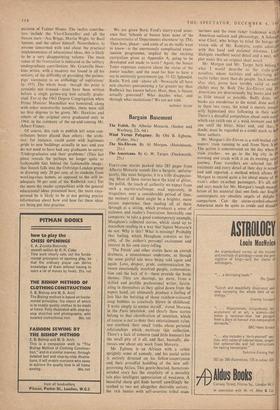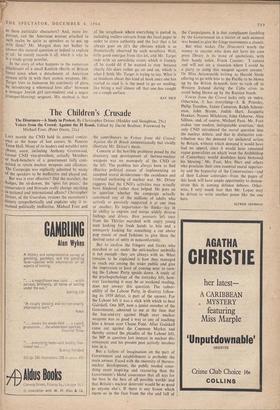Bargain Basement
Wind Versus Polygamy. By Obi B. Egbuna. (Faber, 16s.)
FORTY-ONE stories packed into 285 pages from Alberto Moravia sounds like a bargain; unfortu- nately, like most bargains, it is a trifle disappoint- ing. Most of these stories have the kind of glitter, the polish, the touch of authority we expect from such a master-craftsman; read separately, in magazines, over a considerable period of time, the memory of them might be a brighter, more joyous experience than reading all of them through at a sitting, which produces a sense of staleness and reader's frustration. Inevitably one compares; to take a good contemporary example, Maugham's collected stories, which stand up to marathon reading in a way that Signor Moravia's do not. Why is this? What is missing? Probably that feeling, which Maugham conveys so for- cibly, of the author's personal excitement and interest in his own story-telling.
The Fetish' and other stories have an overall drabness, a monotonous undertone, as though the same pitiful tale were being told again and again. Love, despair, pride, communication be- tween emotionally involved people, communica- tion and the lack of it—these provide the basic themes. They are shavings, no more, from a skilled and prolific professional writer, fascin- ating in themselves as they spiral down frOm the expert hand, yet ultimately produce a feeling of loss like the bursting of those rainbow-coloured soap bubbles so creatively blown in childhood. 'I write simply to amuse myself,' stated Moravia in the Paris interview, and clearly these stories belong to that classification of intention, which of course is not to deny their entertainment value, nor overlook their small truths about personal relationships which motivate this collection. There's a lack of concern (and little humour) for the small pity of it all, and that, basically, dis- tresses one about any work from Moravia.
Mr. Egbuna is an African with a rather sprightly sense of comedy, and his social satire is entirely directed on his fellow-countrymen and their proudful handling of the new self- governing Africa. This gentle-hearted, humorous- minded story has the simplicity of a morality tale plus intelligent appreciation of weakness. A beautiful sharp girl finds herself unwillingly be- trothed to two not altogether desirable suitors: the rich hunter with self-assertive tribal man- nerisms and the even richer tradesman withal American outlook and phraseology. A Solom wise Chief, who brings to mind the benign tele! 'vision side of Mr. Kenyatta, copes admiralg with this local and national dilemma. LiV dialogue, excellent social detail and a neat, wt plot make this an-original short novel.
Mr. Morgan and Mr. Target both belong what I would describe as the study-groll? novelists, whom statistics and advertising d:ill excite rather more than do people. Such noveli,s also, alas, prove how terribly valid so man? clichds may be. Both The Six-Eleven and 7y Americans are determinedly big books and led1 as little unsaid as possible. Badly done, such books are murderous to the mind; done well. in these two cases, the mind is merely tempo(' arily hypnotised into following in their Wake. There's a dreadful compulsion about such novel,' which can catch one at a weak moment and hot' one until the bitter, bitter end, and that, 11° doubt, must be regarded as a credit mark to both these authors.
Mr. Morgan's Six-Eleven is a well-heeled cool' muters' train running to and from New YO' The action is concentrated on the day when iht train crashes: we go to the big city in iht ' morning and crash with it on its evening rettlio journey. Four travellers are selected for foil, treatment and every detail of their day is scrutit ised and reported, a method which allows NO Morgan to record quite a lot about many of IV train's other ex-urban- passengers. It's all nice' and says much for Mr. Morgan's tough manipw lation of his material that one feels our English counterparts are absolute angels of delight comparison. Can • the status-symbol-obsess'' American male be quite as crude and dreadf01 it as these particular characters? And, more im- ;,i portant, can the American woman attached to .i. such males be quite as spineless as to put up 1 With them? Mr. Morgan does not bother to answer this natural question or indeed to explain t at all : he merely records it all, which is why he is a study-group novelist. 1 I In the story of what happens to the numerous inhabitants of a small Kentish (Battle of Britain fame) town when a detachment of American airmen settle in with their atomic weapons, Mr. Target tries to humanise his continuity of plots by introducing a whimsical love affai' between a teenager Jewish girl (art-student) and a negro (trumpet-blowing) sergeant. His method is that
of the scrapbook where everything is pasted in, including endless extracts from the local paper in order to stress authority and the fact that a lot always goes on (it's the obvious which is so dramatically observed by such novelists). Well, 4ittle good emerges from this lot, and Mr. Target ends with an unrealistic event, which is frankly all he could do if he wanted to stop because clearly life does rather go on and on, which is \vhat I think Mr. Target is trying to say. What is so insidious about this kind pt book once one has started 'to read it, is the need to go on reading, like biting a nail almost off that one has caught on a rough surface.
KAY DICK



































 Previous page
Previous page